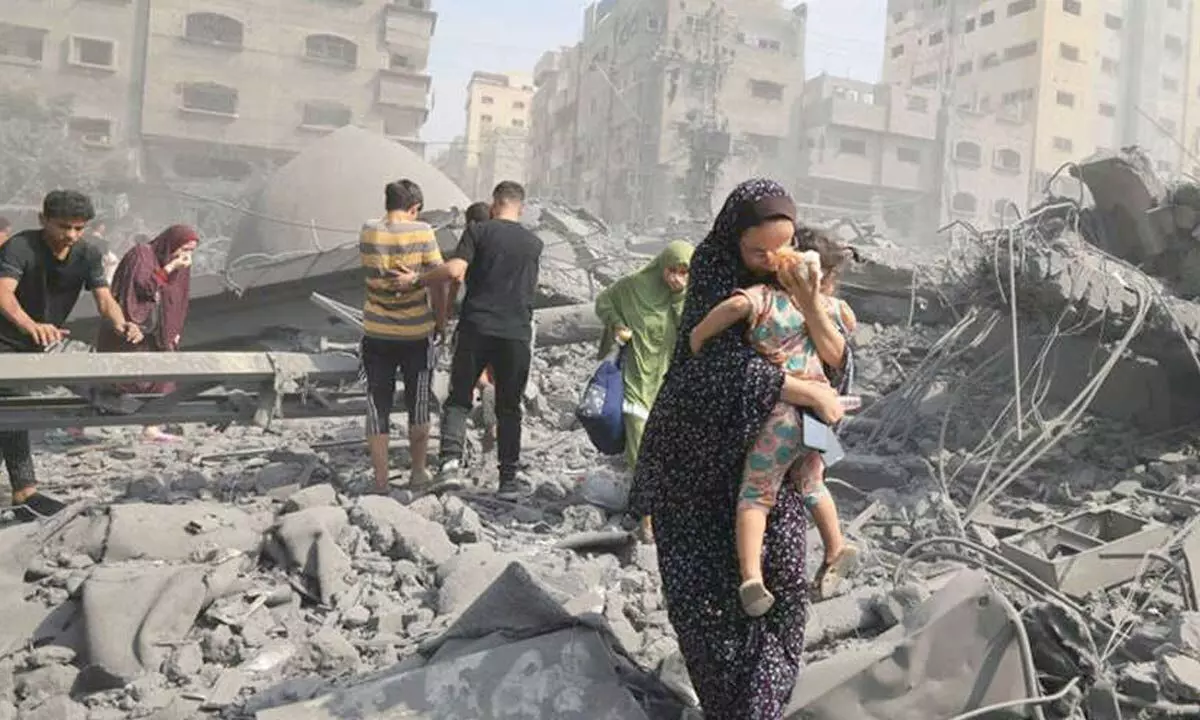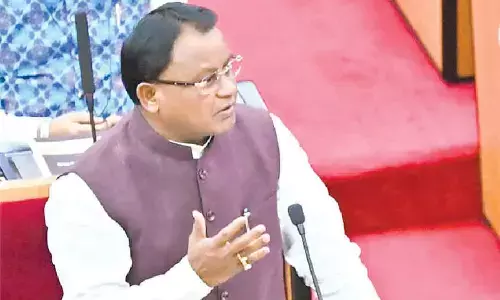There is too much of collateral damage

Palestine should not be all about destruction without any settlement
New Delhi: A month after the large-scale attack by Hamas on Israel, resulting in the killing of some 1,400 civilians that evoked an armed offensive from Israel on Gaza, the conflict in the Middle East has predictably escalated with Israel preparing to militarily ‘eliminate’ Hamas, Iran-backed Hezbollah declaring it is fully prepared to join the combat and the US extending military support to Israel through its Sixth fleet in the Mediterranean.
The Arab states seemed to be watching the situation, divided as they are between the anti-US radical forces represented by Syria, Yemen, and Qatar and those like Saudi Arabia, UAE and Bahrain -- fundamentalist but deeply aligned with the US. This showed up on expected lines considering that Hamas has over the years of the US-led ‘war on terror’, become a front of Islamic radicals though it originated in the mould of anti-Left pro-Islamic State organisations like Muslim Brotherhood of Hasan Al-Banna in Egypt and Syria, and Jamaat-e-Islami of Maulana Maududi in undivided India, with no hostility towards the West.
The Arab Spring of 2011 marked a general shift in the Muslim world towards a hardline Islamic dispensation in replacement of personal dictatorships. After the ouster of Hosni Mubarak, the forces drifted towards the revivalist call of going back to the times of the Pious Caliphs and found no fault with radicalisation and the terrorist violence that went with it, causing discomfiture to the West. The present regime in Egypt headed by President Abdul Fattah El Sisi favours Islam but not its radicalisation and is in the good books of the US.
Radicalisation incidentally finds acceptance in countries like Pakistan, Turkey, and Malaysia that rode two horses by trying to be on the right side of the US while supporting Taliban, Al-Qaeda and ISIS. Developments in the Middle East revolving around the Israel-Hamas confrontation seemed to be accentuating these alignments within the Islamic world.
In his first open response since Hamas attacked Israel on October 7, Hassan Nasrallah, head of the powerful Hezbollah movement, asked the Americans to immediately stop the aggression if they did not want ‘a regional war’, saying that the US fleet in the Mediterranean ‘does not scare us’ and that ‘we are ready to face it’. Hezbollah along with the armed groups from Iraq, Syria and Yemen represents a regional Iran-led ‘axis of resistance’ against the US and Israel.
Remarks of the Hezbollah chief appeared defensive in as much as they referred only to regional dimensions of the conflict and did not talk of any larger global threat. Iran already in conflict with the US would – it seems – not like to get directly involved in the Hamas-Israel military confrontation. Meanwhile, it has taken a month for Israel Defense Forces to reach ‘the heart of Gaza city’ described by Israel’s Defence Minister Yoav Gallant as the ‘largest terrorist base ever built’. He repeated Israel’s determination ‘to destroy Hamas’.
A deterrence for anti-Israel forces in the Middle East is the clear message given by President Biden that the US was going to be fully behind Israel in the event of the conflict escalating into a regional war. His reference to the India-Middle East-Europe Economic Corridor and mention of Israel’s stakes in it has elevated American involvement in the region to a level where it is a part of the geopolitical strategy of the US to counter the initiatives China had been advancing to enhance its foothold in the Middle East.
It is here that the Arab block led by Saudi Arabia has to play an effective role in checking the spread of radicalisation in the region. India’s strategic interests leave little doubt about which side of the fence this country should be on, in the event of Islamic radicals advancing their hold in the Muslim world. The challenge before Israel is to put down Hamas, without causing too much collateral damage. Permitting supplies and medical aid for displaced people in Palestine is important given the fact of this conflict in all likelihood getting protracted into a war of attrition.
The success of its G20 Presidency should enable India to back a position that sat well with the principles of humanitarian good, no resort to ‘wars’ and terrorism and the promotion of world peace.
American policymakers, however, need to become realistically aware of the role of the Sino-Pak axis in weakening the cause of the democratic world order. As already mentioned Pakistan, Turkey and Malaysia seem to have developed a convergence on accommodating radicals and not toeing the US line on the Middle East.
The deeply religious angle in the Israel-Palestine conflict has to be sorted out through the path of inclusivity and respect for all faiths without bringing in notions of ‘supremacism’ of one religion.
The communal interpretations of Israel-Hamas confrontation has had a certain fallout in the Muslim world, including the subcontinent, where the historical memories of the anti-West Wahabbi Jehad of the 19th century, Khilafat movement of later times and the strong currents of pan-Islamism in the 80’s promoted by the OIC under the chairmanship of Saudi Arabia, have all conditioned the thinking of Muslims guided by the Ulema and the communal-minded elite.




